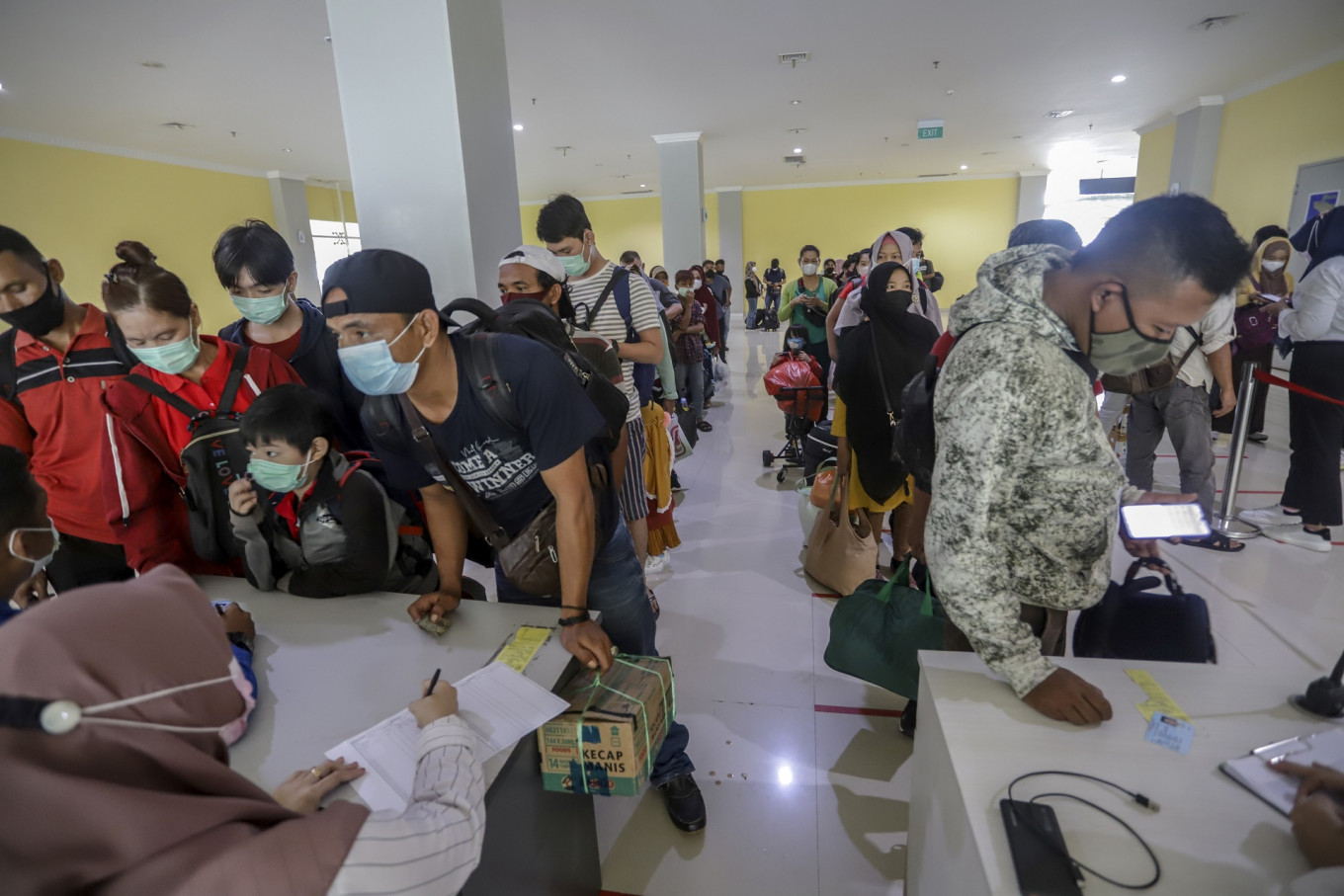Thousands turned back to stop Idul Fitri exodus
Many try to outsmart officers to get to their hometowns
Change Size

D
espite the government’s attempts to stop people from visiting their hometowns for Idul Fitri, resulting in tens of thousands of vehicles forced to make a U-turn at toll gates, some travelers have managed to find a way around the mudik (exodus) ban.
National Police Traffic Corps (Korlantas) chief Insp. Gen. Istiono said on Saturday evening that three days into the mudik ban, the police had stopped around 70,000 vehicles and instructed drivers to go back to where they came from after they failed to produce the necessary permits and travel requirements.
They were stopped at 381 checkpoints spread across Sumatra, Java and Bali, where a joint team of 155,000 personnel from the police, Indonesian Military (TNI), Public Order Agency (Satpol PP) and the Transportation Ministry have been deployed.
In Jakarta, some 6,500 vehicles were told to turn around because of the mudik ban, which started on Thursday and will last until May 17. In a bid to curb COVID-19 transmission, the government imposed the ban for the second year, only allowing out-of-town travel for urgent matters, such as the death of a family member.
Public officials and public workers are allowed to travel for work-related matters but must carry a permission letter from their respective supervisors and regional heads that states their specific reasons for traveling. Those who wish to travel during the ban must also obtain an entry and exit permit (SIKM) issued by their respective local administrations.
While a drop in toll road users and certain modes of public transportation has been reported from before the mudik ban, the number of travelers, regardless of their purpose, was still in the tens of thousands. On the second day of the ban, the Transportation Ministry recorded a 16 percent increase in plane passengers traveling for non-mudik purposes from the first day.
In total, authorities in West Java have had to force at least 22,000 out of the 64,000 vehicles intercepted at 158 checkpoints to make a U-turn as of Friday, said West Java Governor Ridwan Kamil.
Read also: Bribes, lies and black sticky rice: Indonesians outsmart 'mudik' ban
Despite these efforts, office worker Inas was able to return to her hometown in Subang, West Java, from Bandung by motorcycle, without bringing any required documents.
“I deliberately chose to travel at night because the officers must be feeling cold, so the monitoring will be loose.”
Other travelers in East Java used the same strategy and also took shortcuts to avoid checkpoints. East Java Police traffic director Sr. Comr. Latif Usman said the police would monitor these smaller, alternative roads for 24 hours.
Latif added on Sunday that on the first day of the mudik ban, 3,169 vehicles — mainly cars and motorbikes — were forced to turn around. On Saturday, the police forced at least 130 buses carrying homebound travelers to return to their departing points, all filtered at nine entry points connecting the province to Central Java and Bali. From 10,000 intercepted motorbikes, 8,000 were told to turn back, he said.
Meanwhile, North Sumatra Governor Edy Rahmayadi has threatened travelers within or beyond the province with sanctions should they proceed with their mudik trips.
“The sanctions start from verbal warnings to include physical and administrative punishments. North Sumatra already has a regulation [on sanctions],” he said.
Read also: Policy inconsistencies muddy ‘mudik’ measures
Even then, 32-year-old teacher David was able to arrive at his parents’ home in the provincial capital of Medan by Saturday evening, traveling by car from Tebing Tinggi and taking smaller roads through villages to avoid checkpoints. The bus he initially boarded to make the trip had been forced to turn around.
“Idul Fitri is a special moment; I’d do anything to see my parents,” he said.
The government initially allowed people to travel during the ban within an agglomeration area such as Greater Jakarta but backpedaled on the policy late last week.
In contrast, Surakarta Mayor Gibran Rakabuming Raka, the son of President Joko “Jokowi” Widodo, has allowed people to go on mudik in the agglomeration area that covers the city and six other surrounding cities.
“If the mudik ban is applied locally, we’ll have difficulties stopping [people]. There are so many access roads to the borders separating Surakarta and other cities. Surakarta is very small,” he said.
Homecoming trips have amplified concerns over an exponential rise in COVID-19 cases after the Idul Fitri holiday, especially following the recent discovery of a more transmissible coronavirus variant from India, the B1617.
Read also: 'Don't scapegoat migrant workers for COVID-19 surge': Activists
It was recently detected in a medical worker in Indonesia and has been deemed a variant of concern by the United Kingdom’s health authorities for being as transmissible as the UK variant. The latter has also been locally transmitted in Indonesia.
The government has expressed concerns about travelers arriving from abroad. East Java COVID-19 task force head Mahkyan Jibril said that as of Friday, 5,679 passengers had arrived at the Juanda International Airport, 53 of whom had tested positive upon arrival.
Home Minister Tito Karnavian said he would consult with Foreign Minister Retno Marsudi on issuing travel documents in lieu of passports (SPLP) so that undocumented migrant workers could still return to Indonesia through the designated entry points.
Epidemiologist Laura Navika Yamani said that a possible increase in COVID-19 cases would be inevitable, urging the government to upscale its testing, tracing and isolating efforts, as well as other healthcare facilities as early as possible to anticipate the spike.
-- Apriadi Gunawan, Wahyoe Boediwardhana and Ganug Nugroho Adi contributed to the story from Medan, Surabaya and Surakarta









